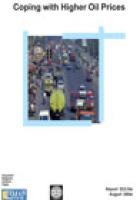Publications
All governments, but especially petroleum importers, are considering several questions:
• How can the increasing burden of the higher costs be shared between various parties in the economy in order to optimize social welfare?
• How can the costs of supply to users be reduced, so that the total burden is reduced?
• How can governments encourage the reduction of petroleum product consumption (and of the aggregate petroleum import bill in the case of an importer)?
• How can governments achieve “buy-in” from the public to the policies they pursue?
This study focuses on the impact of higher fuel prices on consumers and evaluates the various approaches to answering the four questions posed above. It draws its evidence and conclusions from the recent experiences of 38 developing countries that have tried various policy alternatives.
Bacon, Robert and Kojima, Masami. 2006. Coping with Higher Oil Prices. ESMAP Report 323/06. Washington, DC: World Bank.
